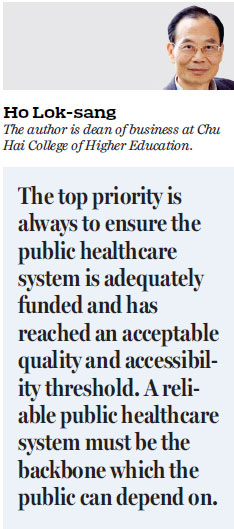Healthcare a far more urgent, serious problem
Updated: 2018-05-08 07:35
(HK Edition)
|
|||||||
Ho Lok-sang notes only a minority can be seen as 'housing needy' while restructuring of medical funding is more urgently needed
Although surging housing prices hit the headlines all the time, actually healthcare is a far more urgent and serious problem that Hong Kong faces today. I urge the government and the public give this problem priority attention.
In politics, perception is everything. In public policy, however, we are more interested in facts. In Hong Kong, as of the end of last year, 49.5 percent of all the 2.54 million households already own their homes, while another 30.6 percent are already living in public rental housing. Of the households 1.56 percent enjoy accommodation provided by their employers. Only roughly 16.1 percent of households, or 409,000 households, live in private rental housing. High housing costs are potentially a problem mainly for these households. There is a long queue for public housing, which is still getting longer. This is bad, and the government is doing the right thing looking for more land and trying to build up a land bank over the course of time. But healthcare is a more urgent and serious problem, because poor healthcare is costing lives and subjecting many families to distress because of protracted access to needed diagnosis and care, and more frequent occurrence of unfortunate medical incidents.

In this very column (March 24, 2015) I had noted that the voluntary health insurance scheme (VHIS) had some attractive features, in particular in that the government would guarantee that those considered to be high risk would pay no more than three times the standard premium through subsidizing the cost of insuring those at high risk and in that members of the scheme would have the peace of mind of knowing that their insurers would not discontinue an insurance policy or a coverage because of high cost. Yet I had warned that the introduction of the VHIS would aggravate manpower shortages in the public healthcare sector. Today, as a TV documentary over the weekend noted, most of the attractive features have been watered down or have completely vanished. We have wasted valuable time and have hardly inched forward.
As one who has studied the healthcare systems around the world for decades, the lack of progress is very frustrating and very sad. From my years of study - and I have two books on healthcare reform dating back to 1997 - I have come to some conclusions about what needs to be done to greatly enhance the public interest.
First, the top priority is always to ensure the public healthcare system is adequately funded and has reached an acceptable quality and accessibility threshold. A reliable public healthcare system must be the backbone which the public can depend on. Private healthcare must be supplementary, and must serve only as an option for those who can afford it, and must not be forced upon a helpless patient because the public system fails to deliver.
Second, to ensure the adequate funding of the public healthcare system, the pricing of publicly provided healthcare services needs to be raised appropriately. To ensure that this will not affect affordability, I have proposed setting an annual cap on eligible healthcare service charges. The government will pay for all costs for the year beyond the cap. So people will know what would be the most that they need to pay for. I had called this Excessive Burden Protection or Excessive Burden Insurance in my books. Under my proposal, patients will pay more, but they know that they will never have to pay beyond a certain amount. Today, annual health insurance for a person easily exceeds HK$10,000, especially for those aged 65 or more. Those who buy health insurance may have to pay in excess of HK$10,000 per year, year in year out, even though they stay healthy. Under my proposal, for an elderly person, the maximum that a patient has to pay will be, say, HK$15,000, but payments are necessary only if they need the services. For those below 50, the annual cap will be about HK$5,000. Again, if they stay healthy, they do not have to pay.
The idea is that patients should pay when they can afford it. They should be protected only when they cannot.
For the poor, we can allow lower charges and lower annual caps. We can even give Comprehensive Social Security Assistance recipients an extra stipend to offset the healthcare services payment. This will ensure accessibility to the poor.
Third, I have also developed the idea of Lifetime Healthcare Supplement, which is a standby fund fixed at, say, half a million (this is for illustration only) HK dollars. Patients can draw on these funds to spend on costly drugs or therapies not otherwise covered, provided that they match withdrawals with their own contributions. Given human nature, I would expect not many people will use the contingent funds as that is a last-resort protection.
Actually the idea of an annual cap on eligible healthcare expenses is now used in many lands, including Taiwan and Sweden. Excessive Burden Protection with higher fees will give our healthcare system much more resources, and will also motivate prevention. Above all, my proposals are easy to implement. Why wait longer?
(HK Edition 05/08/2018 page8)